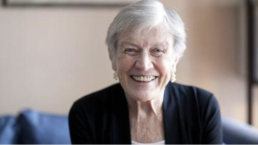These life stories may contain descriptions of childhood trauma and abuse, as well as images, voices and names of people now deceased. If you need help, you can find contact details for some relevant support services on our support page.
Award-winning American writer, Paula Fox (1923-2017), was in an orphanage, kinship care, and foster care during her childhood.
Paula Fox was born in Manhattan to screenwriters, Elsie De Sola and Paul Hervey Fox. Paula was immediately put into a foundling hospital after her birth because the couple did not want their child.
Paula’s maternal grandmother was unhappy about this and retrieved her. But by the time she was five months of age, Paula had been given to a Congregational minister, the Reverend Elwood Amos Corning in Blamville, New York.
Paula lived with the minister for several years. Then, when that did not work out, “Paula was passed around among relatives and friends and paid help.”
And so it goes on. Fox goes to live in Queens and, later, Cuba with her grandmother. She pitches up in Jacksonville, Florida, for a little while and in Nantucket and Montreal [at boarding school]. In between these sojourns, there are painful shards of time spent with her parents…Finally, at 18, she is sent to Hollywood in the care of an alcoholic family friend (Cook).
Paula repeated her parent’s behaviour and gave up a baby for adoption when she was twenty years old. Her daughter, Linda Carroll , became a writer, psychologist, and mother of singer Courtney Love. Paula and Linda finally met when Paula was in her seventies.
Paula worked a variety of jobs in her early adult years. She left San Francisco for Europe after WWII where she worked as a news reporter covering postwar conditions in France and Poland for a small British news service.
Paula then returned to the United States, got married, raised two sons, and worked as a teacher. She initially struggled as a writer, and published her first young adult book in her forties.
Joan Acocella argues that because of her childhood Paula became an acute observer. Amy Rosenberg notes that it is this skill that “infuses Fox’s writing, and it’s especially striking in her memoirs.”
Paula won many awards for her books. She won the Hans Christian Andersen Award in 1978 in recognition of her many children’s books. She also won two Newbery Medals for her novels, The Slave Dancer (1974), and One-Eyed Cat (1984), and a US National book Award for A Place Apart (1981).
In 1991, all of Paula’s novels were out of print. But then, novelist Jonathan Franzen read Desperate Characters (1970) and wrote an essay about it. As a result, Norton republished all Fox’s novels between 1999 and 2002.
This garnered Paula’s childhood memoir, Borrowed Finery (2001), more attention than it might otherwise have.
In a series of taut, intimate vignettes, Fox stays true to the young girl’s bewildered viewpoint, and, like the child, the reader wants to get closer, to know more. Yet the drama is in that sense of exclusion, of always being on the edge of secrets (Rochman).
Paula published her second memoir, The Coldest Winter: A Stringer in Liberated Europe in 2005. It includes a collection of short stories about working as a news reporter in Paris and Warsaw in the late 1940s.
Paula was inducted into the New York State Writers Hall of Fame in 2011.
Reflecting on her writing in 2003 she said,
What my growing up gave me was that I didn’t just swim like a goldfish, unaware of anything – water, my environment. I had leapt out of the bowl, so I could see in a certain way that is given to some people and not to others. I think I write mostly about children who, like me, are out of the bowl (Eccleshare).
Paula died in 2017 at the age of ninety-three. She is survived by her third husband, Martin Greenberg, two children, eight grandchildren, and ten great-grandchildren.
References:
Acocella, Joan. (2011). ”From Bad Beginnings. How Paula Fox dealt with her childhood”. The New Yorker, 9 May 2011. https://www.newyorker.com/magazine/2011/05/16/from-bad-beginnings
Cook, Rachel. (2002) ”Borrowed Finery”. The Guardian, 1 September 2002. https://www.theguardian.com/books/2002/sep/01/biography.features1
Eccleshare, Julia. (2017). “ Paula Fox Obituary”. The Guardian, 4 April 2017. https://www.theguardian.com/books/2017/apr/04/paula-fox-obituary
Mallon, Thomas. (2001). A Disposable Child, The New York Times, 7 Oct 2001. https://www.nytimes.com/2001/10/07/books/a-disposable-child.html
Rochman, Hazel. (2001) Borrowed Finery. The Booklist, 98(1), 43.
Rosenberg, Amy (2005). More to the Story, Poets & Writers, 33(6), 40-46.
Image available here.
